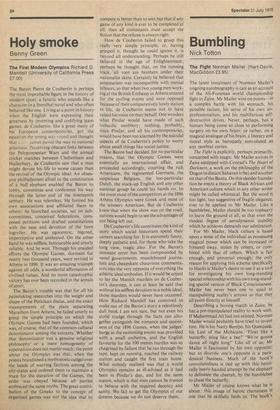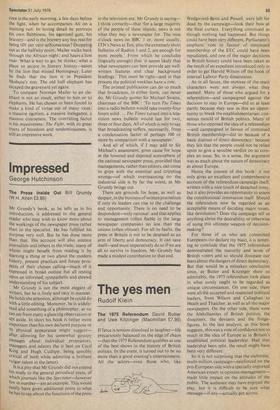Bumbling
Nick Totton
The Fight Norman Mailer (Hart-Davis, MacGibbon £3.95) The latest instalment of Norman Mailer's ongoing autobiography is cast as an account of the Ali-Foreman world championship fight in Zaire. Mr Mailer wins on points—in a complex battle with his stomach, his possible racism, his sense of his own un professionalism, and his multifarious self destructive drives. Never, perhaps, has a human being come so close to performing surgery on his own brain; or rather, on a magical analogue of his brain, a literary and moral style as baroquely convoluted as any cerebral cortex.
The Fight is explicitly, perhaps primarily, concerned with magic. Mr Mailer arrives in
Zaire equipped with Conrad's The Heart of Darkness, a work on the philosophy of the Dogon (a distant Saharan tribe) and another on that of the Bantu. On this slender foundation he erects a theory of Black African and American culture which in any other writer might be called whimsical. But the word is too light, too suggestive of fragile elegance. ever to be applied to Mr Mailer. Like a bumblebee, Mailer should be too topheavY to leave the ground at all, so that even the modest degree of aerodynamic stability which he achieves demands our admiration.
For Mr Mailer, black culture is based upon a sense of the individual as possessing magical power which can be increased or frittered away, stolen by others, or combined with that of others. Which is fair enough, and universal enough; the only reason for applying this schema specifically to blacks is Mailer's desire to use it as a tool for investigating his own long-standing special relationship with his own long-standing special version of Black Consciousness. Mailer has never been one to quail at manipulating reality's arrows so that they all point directly at himself.
Describing a boxing match in Zaire, he has a pre-manipulated reality to work with. If Muhammad All had not existed, Norman Mailer would probably have tried to invent him. He is his Natty Bun-4)o, his Queequeg, his Last of the Mohicans. 'Float like a butterfly, sting like a bee!' We're gonna dance all night long!' Like all of us, Mr Mailer is fascinated by his own opposite; but to describe one's opposite is a paradoxical business. Much of the book's convolutedness is tied up with this heroically heavy-handed attempt by the elephant to delineate the cheetah, by the bumblebee to chase the butterfly.
Mr Mailer of course knows what he is about: this image of heroic clumsiness is one that he skilfully feeds us. The book's core is the early morning, a few days before the fight, when he accompanies Ali on a training run. In loving detail he portrays his own flabbiness, his agonised guts, his bravery—and is the bravery any less real for being 101 per cent selfconscious? Dropping out at the halfway point, Mailer walks back through the African night ; and hears a lion roar. What a way to go, he thinks; what a Place to secure in literary history—eaten by the lion that missed Hemingway. Later he finds that the lion is in President Mobutu's zoo. The old bull elephant has escaped the graveyard yet again.
To compare Norman Mailer to an elephant is not an insult, either to him or to elephants. He has chosen or been forced to make a kind of virtue out of many vices: a massive egotism, a massive inelegance, a massive coarseness. The overriding factor is his massiveness: The Fight, with its great tracts of boredom and tendentiousness, is still an impressive work.



































 Previous page
Previous page